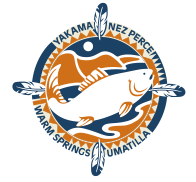Tribal people across the United States are once again showing the way, this time by leading the country in vaccination rates. As of this week, 55 percent of Natives in Umatilla County are vaccinated compared to only 31 percent for the whole county. And 51 percent of the eligible Native population in Yakima County is vaccinated compared to 41 percent for the county in general. NBC News reported last week that 98 percent of the eligible population on the Blackfeet reservation has been fully vaccinated against the disease, compared to about 40 percent of Montana’s total population.
Medical researchers found that the cultural teachings to think of the needs of the whole tribe was one reason the vaccination rate is so much higher in Indian Country compared to the national average.

“I was hesitant at first, but I did both my shots not for me but for my parents, for our elders, and for the unknown trails ahead.”
—Erik Holt, Nez Perce
The Kaiser Family Foundation conducted a national survey of American Indian/Alaska Native people in late 2020 and found that the majority were willing receive a COVID-19 vaccine and that the most commonly held motivation for getting a vaccine was a sense of responsibility to protect the Native community and preserve cultural ways.
Vanessa Begaye, Navajo, told the Wall Street Journal: “Pretty much the whole Navajo Nation wanted to get the vaccine as soon as it came out. We all felt it was the right thing to do, to protect our families, especially our elders. Almost everyone I know has lost someone, and we all just want this pandemic to be over.”
Another reason for the high vaccination rates among tribal people is the cultural memory of past pandemics.Chuck Sams, the former Covid response lead for the Confederated Tribes of the Umatilla Indian Reservation told OPB: “The tribes have faced pandemic before; our last one ended in around 1860, but that cost us nearly 90% of our tribal membership — lost to the measles between 1780 and 1860. That memory still lives on in many of us,”
At a recent CRITFC commission meeting, Commissioner Bill Yallup, Jr, Yakama, said, “When I was young, we would drive along the Columbia River and my great grandmother would tell me about all the people who lived there. ‘They’re all gone now, because that sickness killed them all.’ She was born in 1857 and this was in the late 50s. ‘They’re all gone; sickness killed them.’ We don’t want that to happen again. There’s only 11,000 Yakamas left. We can’t be losing our people; we can’t be losing our history. Those elders have knowledge and wisdom about things and how things were.”

“There’s only 11,000 Yakamas left. We can’t be losing our people; we can’t be losing our history.”
—Bill Yallup Jr, Yakama
In a recent poll of Native Americans who hadn’t been vaccinated, the most common reasons given were difficulty with transportation to vaccination locations; finding time due to jobs, family and child responsibilities, or other community responsibilities; or unsure if their preexisting health condition made them ineligible. These are all concerns that the River People have reported, too. Fortunately there are a number of community resources to help tribal members with these issues. See resource list at end of article.
As of June 11, the Indian Health Service has safely administered 1.4 million vaccines to tribal members throughout the U.S. This includes the 73,607 that were administered by the Portland Area IHS system that serves the Pacific Northwest area. So far, there have been 2.26 billion doses given worldwide and they are turning out to be as effective in the real world as the trials showed, with some giving more than 90 percent protection. They are also being found to be effective against some of the newer COVID variants that are more contagious and have a higher risk of serious complications.

“I don’t want to catch COVID or spread it accidentally. My elders taught me to protect myself and to protect others, and getting the vaccine will do both.”
—Rachelle Begay, Yakama
State officials reported that 98% of the people diagnosed with COVID-19 in Oregon in May were unvaccinated or were only partially vaccinated. While the overall case numbers are going down, they are still high among the unvaccinated population.
The tribes encourage all eligible tribal members to get vaccinated, especially as we move into the summer fishery and crowded fishing access sites. By being vaccinated, you are doing your part to not only protect yourself, but also children and those who cannot be vaccinated due to health issues. Together we can protect our most precious resource: our tribal members and the culture we safeguard for the future.
“It’s about being a good ancestor and doing everything you can do to look to the future and trying to make it a better life for the next seven generations,” said Mari Raphael, RN at the Grand Traverse Band of Ottawa and Chippewa Indians health center.
Vaccine Access Resources along the Columbia River
Transportation: If you need assistance getting to a vaccination location, contact Star Tennison from One Community Health at (541) 386-6380.
Finding Time: One Community Health offers in-clinic vaccines by appointment in Hood River and The Dalles. Call (541) 386-6380 to schedule your vaccination at a time that works for you.
Health Questions: If you have a pre-existing health condition so aren’t sure if you should get a vaccination, contact One Community Health’s outreach nurse Rosey Suppah at (541) 386-6380 who can answer your questions.
